This group of words is
obviously opposed to the other groups of the non-literary English
vocabulary and therefore its stylistic functions can be clearly
defined. Dialectal
words are
those which in the process of integration of the English national
language remained beyond its literary boundaries, and their use
is generally confined to a definite locality. We exclude social
dialects or even the still looser application of the term as in
expressions like poetical dialect or styles as dialects.
We are not concerned here with the historical aspect of dialectal
words. For our purpose it will suffice to note that there is a
definite similarity of functions in the use of slang, cockney and any
other form of non-literary English and that of dialectal words. All
these groups when used in emotive prose are meant to characterize the
speaker as a person of a certain locality, breeding, education.
There is sometimes a
difficulty in distinguishing dialectal words from colloquial words.
Some dialectal words have become so familiar in good colloquial or
standard colloquial English that they are universally accepted
as recognized units of the standard colloquial English. To these
words belong lass,
meaning ‘a
girl or a beloved girl’ and the corresponding lad,
‘a boy or
a young man’, daft
from the
Scottish and the northern dialect, meaning ‘of unsound mind, silly’;
fash also
Scottish, with the meaning of ‘trouble, cares’. Still they have not
lost their dialectal associations and therefore are used in literary
English with the above-mentioned stylistic function of
characterization.
Of quite a different nature
are dialectal words which are easily recognized as corruptions
of standard English words, although etymologically they may have
sprung from the peculiarities of certain dialects. The following
words may serve as examples: hinny
from
honey;
tittle apparently
from sister,
being a
childish corruption of the word; cutty
meaning a
‘testy or naughty girl or woman’.
Most of the examples come from the Scottish and the northern
dialects. This is explained by the fact that Scotland has struggled
to retain the peculiarities of her language. Therefore many of the
words fixed in dictionaries as dialectal are of Scottish origin.
Among other dialects used
for stylistic purposes in literature is the southern dialect (in
particular that of Somersetshire). This dialect has a phonetic
peculiarity that distinguishes it from other dialects, viz.
initial
[s] and |f] are voiced, and are written in the direct speech of
characters as [z] and [v], for example: ‘volk’ (folk),
‘vound’ (found), ‘zee’
(see),
‘zinking’
(sinking).
Dialectal words are only to be found in the style of emotive prose,
very rarely in other styles. And even here their use is confined to
the function of characterizing personalities through their speech.
Perhaps it would not be a false supposition to suggest that if it
were not for the use of the dialectal words in emotive prose they
would have already disappeared entirely from the English language.
The unifying tendency of the literary language is so strong that
language elements used only in dialect are doomed to vanish, except
those which, because of their vigour and beauty, have withstood the
integrating power of the written language.
Writers who use dialectal words for the purpose of characterizing the
speech of a person in a piece of emotive prose or drama introduce
them into the word texture in different ways. Some writers make an
unrestrained use of dialectal words and also slang, jargonisms and
professionalisms, not only in characterization, but also in
their narrative. They mistake units of language which have not yet
established themselves in standard English for the most striking
features of modern English. An over-abundance of words and phrases of
what we call non-literary English not only makes the reading
difficult, but actually contaminates the generally accepted norms of
the English language.
Other
writers use dialectal words sparingly, introducing only units which
are understandable to the intelligent English reader, or they make
use of units which they think will enrich the standard English
vocabulary. Among words which are easily understood by the
average Englishman are: maister,
weel, eneugh, laird, naethlng and
the like, characteristic of Scottish.
Dialectal words, unlike professionalisms, are confined in their use
to a definite locality and most of the words deal with the everyday
life of the country.
«Such words will for the most part be of a more or less
technical character and connected with agriculture, horses,
cattle and sport.»
Соседние файлы в предмете [НЕСОРТИРОВАННОЕ]
- #
- #
- #
- #
- #
- #
- #
- #
- #
- #
- #
Everyone who speak Russian, easily finds words such as, for example, «talk», «food», «blizzard», and can not simply define them, but to use them in the correct format in the context.Such words are called public, or of public lexicon.But to explain what «bayat», «brashno», «vyalitsa», can not everyone knows these words only a small circle of people.However, such non-literary language in conversation and most people do not consume.
dialect words: determination
It is well-known, used in literature and in the speech of people, regardless of their place of residence and profession of the words are the basis of the Russian language, yet remaining expressions are not public — they are used only in certain circles of the population.These include jargon specific and dialect words.In Russian they are called limited use of vocabulary.These words are divided into groups, each of which has its own characteristic.
Lexical
Certain groups of the population, carriers of non-public lexicon, consist of a huge number of groups scattered over the expanse of the country and even abroad.Each of them in everyday life has its own special words, each divided by a certain feature: occupation, place of residence and social class.So what are called dialectal word?It is those that are used in certain areas.For example, in the Pskov region there is such a thing as severik on Baikal the same phenomenon called Barguzin, and on the Danube — Belozerov.Literature is a synonym of the word — the wind.
dialect words is part of the group at the location, and words related only to the human occupation of a professional group.But jargon it relates to certain sections of society.
Where common dialect vocabulary
In each area has its own specific words that are used only in this area.For example, in the south of the country can meet these interesting words: area, which means the bushes;Koszul that corresponds to the way the land.In the northern cities, you can also find interesting examples of dialect speech: Teplin, which means fire;lava — bridge and roe — plow.
Classification dialect expressions
In literary and book speech can be found so-called dialect — words that are essentially dialect, but have their word formation, grammar and phonetic features and belong to a particular dialect.Dialect is divided into 4 groups:
- Semantic dialect — is a group of words that in a certain dialect to use unorthodox sense.For example: a cloud — storm, order — wood, arrogant — a sudden.
- Ethnographic dialect called object or phenomenon peculiar to a particular population and unknown in other areas.As a rule, a dialectal word has synonyms in common speech, and determination it is possible to give only descriptively.For example: Plahtiy — skirt made of a piece of cloth, duleyka — wadded jacket, tonets — a thin pancake made from unleavened dough.
- Phrasebook dialect — is the immutable word combinations having a certain value in a particular area.For example: bored — bored fall withered — in the salt villages, something heavy and difficult — without the death of death.
Where are dialect words?
Examples of use of such expressions can be seen not only in conversation but also in literary works.Although, of course, raises the question of how, and most importantly, the extent to which such language can be used for artistic purposes.The theme of the work and the goals set by the author, it is determined what kind of dialect word can be used in a particular case.It may take into account a number of factors — this aesthetic ideals, and skill, and, of course described object.Indeed, sometimes it is using only conventional speech, impossible to convey all the color and character.For example, Tolstoy often enough to describe the peasants in his works using dialect words.Examples of their use can be found in the literature and Turgenev, he used them as inclusions and quotes that are quite clearly distinguished in the text.Moreover, such inclusion in its composition have commented that fully reveal their meaning, but without the literary context would not have such intensity.
dialect nowadays
Now the works of the authors of the villages also use dialect words, but usually does not indicate their importance, even if the words of a narrow application.Also, similar expressions can be found in newspaper essays, which is characterized by a certain character, his manner of speaking and the characteristic features of his life, it defines the area in which he lives.Given the fact that newspapers should carry weight in the exclusively literary speech, use of dialect should be as justified.For example: «I do not wonder Basil left a little present from oboch.»It should also be noted that each of these unorthodox words should be explained to the reader, because no man reading a book, do not keep a dictionary of dialect words.
dialect as part of the vocabulary of the Russian language
If we talk about the dictionaries, the first mention of the dialect can be found in the «Explanatory Dictionary of Russian Language» VI Dal.This publication can be found 150 articles devoted to this very topic.Today is also the study of dialect is paid great attention, because they, along with archaisms, neologisms, loan words and phraseology, make up a significant part of the vocabulary of the mighty Russian language.And even though most of them are not used in everyday speech and writing, and serves only the passive part, without them it would be impossible to build a bright sayings or vivid description of an object or character.That is why the great writers so often resorted to dialect to give the brightness of the text.Returning to the lexicon, it should be noted that for the study of dialect words there is a whole science called dialectology.
This linguistic discipline studies the phonetic, grammatical, syntactic features of language units that are geographically fixed.Also, special attention was paid to the study of dialect in literature.Linguistics shared understanding of these words:
- broad approach, which tend to include commonly spoken dialect in literary speech;
- narrow approach, where all the set phrases and words used in artistic and journalistic publications.
Summarizing
Delving into the lexical structure of the Russian language, you understand how well the phrase «great and mighty.»After dialect words from their classification and structure are just a small part of a huge system, for which created its own science.And the supply of most of these words is not persistent, it is updated and renewed.And this applies not only dialect, because the number of common words and obscheupotreblyaemyh also constantly increasing, which only emphasizes the power of the Russian language.
The lexical composition of the Russian language is diverse and very interesting. It has many original words, known only to a narrow circle of people. In lexicology, they are called limited in use and isolated in special groups. These include professional, obsolete and dialect words.
The latter can often be heard in rural areas. They exist mainly in lively spoken language and usually reflect the realities existing there. And for the name of the same subject, residents equally can use different options: and «local», commonly used.
Dialect word — what is it?
«There are herrings grazing behind the house.» Not many people, after hearing this phrase, will understand what is at stake. It is understandable. Selytkom in the Russian countryside is sometimes called a foal.
Dialecticisms are words that are actively used by residents of a certain locality and do not belong to any of the lexical groups of the literary language. Their distribution can be limited to a few towns or a whole region.
Interest in the «local» word in Russia arose in the 18th century. Since then, leading linguists and linguists, including V. Dal, A. Potebnya, A. Shakhmatov, S. Vygotsky and others, have done a great job in this direction. They considered various variants and examples of the use of the word dialect. In the literature both domestic and foreign this word today intersects with such concepts as linguistic geography (features of vocabulary in different territories), social dialectology (age, profession, social position of native dialects are taken into account).
Groups of dialects in Russian
In Russia, there are several variants of dialects. The basic principle of combining dialect words into groups is territorial. In accordance with it, the southern and northern dialects are distinguished, which, in turn, include several dialects. Between them are Central Russian dialects, which became the basis for the formation of the modern Russian language and therefore most closely approximated to the literary norm.
Each group has its own dialect words. Examples of their relationships (including common ones): home — hut (north) — hut (south); Speak — bait (north) — gutarit (south).
Formation of dialect words
Each dialect, as a rule, has its own distinctive features. In addition, it is customary in science to single out several groups, which include dialectal words that are different in form of education (examples are given in comparison with the norm).
- Actually lexical. They either do not have any connection with the words in the literary language (for example, the protein in the Pskov region is a vecher, the basket in the Voronezh region is a sapetka), or they are formed from the existing root and retain its basic meaning (in the Smolensk region: to bathe is to steam).
- Lexical and word-building. They differ from common words with only one affix: the poor man — on Don the trouble, the talkative — in Ryazan, talkative, etc.
- Phonemic. The difference from the existing literary norm is in one phoneme (sound): anduk instead of turkey, pahmurny — i.e. Cloudy.
- Osemantic. Completely identical to common words on sounding, writing and form, but differ in lexical meaning: running in the Smolensk region — nimble, noodles in the Ryazan region — the name of chicken pox.
Detailing life through dialect words
Many areas have their own peculiarities of everyday life, manners, relations between people, which are most often expressed in speech. To recreate the full picture of life in such cases can be through dialect words. Examples of words that highlight individual details in the general way of everyday life:
- Ways of laying sheaves of hay or straw (common name — baburka) in the Pskov region: malyanka — small stowage, large-sized otonek;
- The name of the colt in the Yaroslavl region: up to 1 year — a sucker, from 1 to 2 years — a snowdrop, from 2 to 3 years — a tuft.
The designation of ethnographic or geographical features
Another option — when dialect words (examples and meaning of them always cause interest in «outsiders») help to understand the very structure of life. So, in the north it is customary to build a house and build all the outbuildings under one roof. Hence a large number of «local» words denoting different parts of the same building: the bridge — the porch and the porch, the cottage — the living room, the ceiling — the attic, the tower — the living room in the attic, the sowing — the hayloft, the fat — the place in the cattle barn.
In the Meshchersky Region, the main economic sector is forestry. A large group of names is associated with it, which is formed by dialect words. Examples of words: sawdust — sawdust, needles — needles, cut down places in the forest — cutting, a person engaged in stump cutting, — peneshnik.
The use of dialect words in fiction
Writers, working on the work, use all available means to recreate the appropriate atmosphere and reveal the characters’ images. Dialect words play an important role in this. Examples of their use can be found in the works of A. Pushkin, I. Turgenev, S. Yesenin, M. Sholokhov, F. Abramov, V. Rasputin, V. Astafiev, M. Prishvin and many others. More often dialect words are addressed by writers whose childhood passed in the village. As a rule, authors themselves give footnotes containing the interpretation of words and the place of their use.
The function of dialectisms in a work of art can be different. But in any case they give the text uniqueness and help to realize the author’s idea.
For example, S. Yesenin is a poet, for whom the Ryazan dialect words are the main means of recreating rural life. Examples of their use: «in old-fashioned old shishun» — the look of women’s clothing, «at the threshold in the keg’s maid» — a wooden kettle for dough.
V. Korolenko uses local words when creating a landscape sketch: «I look … at the entrance» — the gorge. Or I. Turgenev: «the last … area (large thickets of bushes) will disappear.»
The so-called «village» writers are one of the ways to create a literary image — the speech of the hero, which includes dialect words. Examples: «take (God) you helped (helped)» by V. Astafyev, «they (they) … the earth will be worn out (spoil)» — in V.Rasputin.
The meaning of dialect words can be found in the dictionary: in the explanatory they will have a mark of obl. — Regional or Dial. — dialect. The largest special vocabulary is the Dictionary of Russian Folk Dialects.
The entry of dialectisms into the literary language
Sometimes it turns out that the word, once used by only a certain group of people, goes into the category of commonly used ones. This is a long process, especially in the case of «local» words, but it also takes place in our time.
So, it will not come to anyone’s mind that the well-known word «rustle» by origin is dialectal. This marks the mark of IS Turgenev in the «Notes of the Hunter»: «reeds rustled, as they say», i.e. In the Orel province. The writer’s word is used for the first time as onomatopoeia.
Or no less common — a tyrant, which in the days of A. Ostrovsky was dialectal in the Pskov and Tver provinces. Thanks to the playwright, it has acquired a second birth and today no one has any questions.
These are not isolated examples. On dialect words used to be like an eagle owl, a toy, a tack.
The fate of dialectal words in our time
In connection with the increase in recent years, migration processes within the country, the dialects are now spoken mainly by the older generation. The reason is simple — their language was formed in those conditions when the integrity of the people in certain regions of Russia was strong. The greater is the work of people who study dialect words, which today become one of the ways to study the ethnographic and cultural development, the identity of the Russian people, emphasize its individuality and uniqueness. For the modern generation it is a living memory of the past.
Текст работы размещён без изображений и формул.
Полная версия работы доступна во вкладке «Файлы работы» в формате PDF
Dialectal words are those which in the process of integration of the English national language remained beyond its literary boundaries, and their use is generally confined to a definite locality.
There is sometimes a difficulty in distinguishing dialectal words from colloquial words. Some dialectal words have become so familiar in good colloquial or standard colloquial English that they are universally accepted as recognized units of the standard colloquial English.
Dialectal words are only to be found in the style of emotive prose, very rarely in other styles. And even here their use is confined to the function of characterizing personalities through their speech. Perhaps it would not be a false supposition to suggest that if it were not for the use of the dialectal words in emotive prose they would have already disappeared entirely from the English language.
Writers who use dialectal words for the purpose of characterizing the speech of a person in a piece of emotive prose or drama, introduce them into the word texture in different ways. Some writers make an unrestrained use of dialectal words and also slang, jargonisms and professionalisms, not only in characterization, but also in their narrative.
Vulgar words or vulgarisms.
The term vulgarism , as used to single out a definite group of words of non-standard English, is rather misleading. The ambiguity of the term apparently proceeds from the etymology of the word. Vulgar, as explained by the Shorter Oxford Dictionary, means a) words or names employed in ordinary speech; b) common, familiar; c) commonly current or prevalent, generally or widely disseminated.
These two submeanings are the foundation of what we here name vulgarisms. So vulgarisms are:
1) expletives and swear words which are of an abusive character, like ‘damn’, ‘bloody’, ‘to hell’, ‘goddam’ and, as some dictionaries state, used now as general exclamations;
2) obscene words. These are known as four-letter words the use of which is banned in any form of intercourse as being indecent. Historians tell us that in Middle Ages and down into the 16th century they were accepted in oral speech and after Caxton even admitted to the printed page. All of these words are of Anglo-Saxon origin.
Vulgarisms are often used in conversation out of habit, without any thought of what they mean, or in imitation of those who use them in order not to seem old-fashioned or prudish.Unfortunately in modem fiction these words have gained legitimacy. The most vulgar of them are now to be found even in good novels. This lifting of the taboo has given rise to the almost unrestrained employment of words which soil the literary language. However, they .will never acquire the status of standard English vocabulary and will always remain on the outskirts.
The function of expletives is almost the same as that of interjections, that is to express strong emotions, mainly annoyance, anger, vexation and the like. They are not to be found in any functional style of language except emotive prose, and here only in the direct speech of the characters.
Colloquial coinages (words and meanings).
Colloquial coinages (nonce-words), unlike those of a literary-bookish character, are spontaneous and elusive. This proceeds from the very nature of the colloquial words as such. Not all of the colloquial nonce-words are fixed in dictionaries or even in writing and therefore most of them disappear from the language leaving no trace in it whatsoever.
Some nonce-words and meanings may, on the one hand, acquire legitimacy and thus become facts of the language, while, on the other hand, they may be classified as literary or colloquial according to which of the meanings is being dealt with.
There are some which enjoy hopeful prospects of staying in the vocabulary of the language. The nature of these creations is such that if they appear in speech they become notfceable and may develop into catch-words, Then they become fixed as new colloquial coinages and cease to be nonce-words. They have acquired a new significance and a new stylistic evaluation. They are then labelled as slang, colloquial, vulgar or something of this kind.
Particularly interesting are the contextual meanings of words. They may rightly be called nonce-meanings. They are frequently used in one context only, and no traces of the meaning are to be found in dictionaries.Thus, the word ‘opening’ in the general meaning of a way in the sentence “This was an opening and I followed it”, is a contextual meaning which may or may not in the long run become one of the dictionary meanings.
Most of the words which we call here colloquial coinages are newlyminted words, expressions or meanings which are labelled slang in many modern dictionaries. But we refrain from using the term so freely as it is used in dictionaries firstly because of its ambiguity, and secondly because we reserve it for phenomena which in Russian are known as просторечье, i. e. city vernacular bordering on non-literary speech.
List of references:
Galperin I.R. English Stylistics. Moscow: USSR, 2014. 333 p.
Galperin I.R. Stylistics. M.: Higher School, 1977: 333 р.
Gurevich V.V. English Stylistics. Moscow: Flinta: Nauka, 2008 p.
https://studopedia.com.ua/1_380397_D-Dialectal-words.html
Слайд 2
Dialectal words — are the variety of a
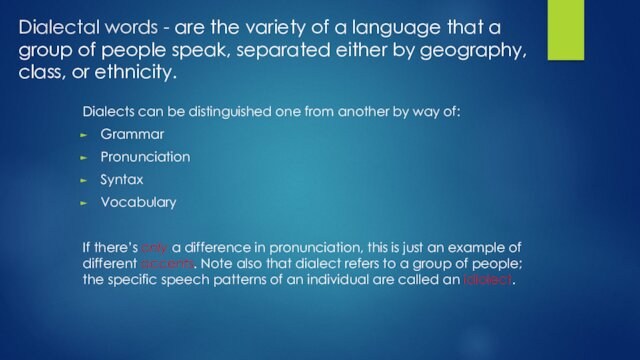
language that a group of people speak, separated either
by geography, class, or ethnicity.
Dialects can be distinguished one from
another by way of:
Grammar
Pronunciation
Syntax
Vocabulary
If there’s only a difference in pronunciation, this is just an example of different accents. Note also that dialect refers to a group of people; the specific speech patterns of an individual are called an idiolect.
Слайд 3
Dialectal words
Some dialectal words have become so familiar
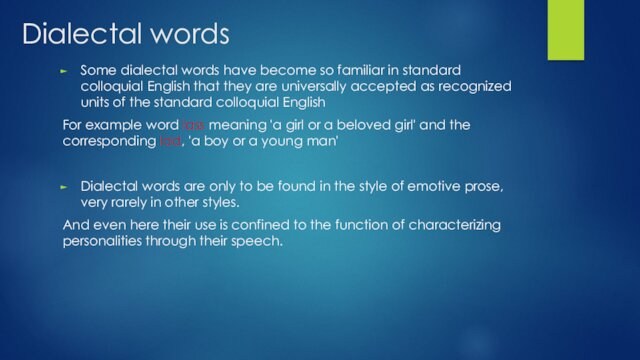
in standard colloquial English that they are universally accepted
as recognized units of the standard colloquial English
For example word
lass meaning ‘a girl or a beloved girl’ and the corresponding lad, ‘a boy or a young man’
Dialectal words are only to be found in the style of emotive prose, very rarely in other styles.
And even here their use is confined to the function of characterizing personalities through their speech.
Слайд 4
Dialectal words
Dialect, colloquialisms, and slang have much in common in
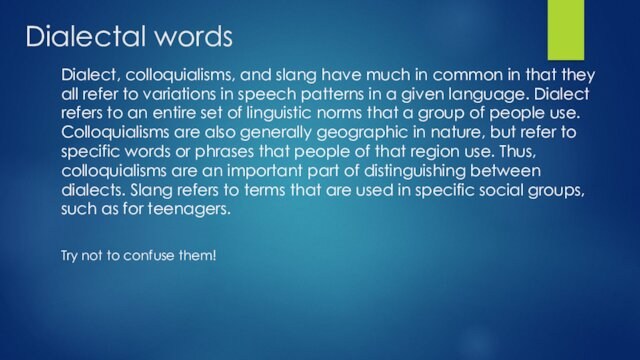
that they all refer to variations in speech patterns
in a given language. Dialect refers to an entire set
of linguistic norms that a group of people use. Colloquialisms are also generally geographic in nature, but refer to specific words or phrases that people of that region use. Thus, colloquialisms are an important part of distinguishing between dialects. Slang refers to terms that are used in specific social groups, such as for teenagers.
Try not to confuse them!
Слайд 5
Dialectal words
Regional dialect
e.g British vs American
Class dialect
e.g Upper/MIddle/Lower class
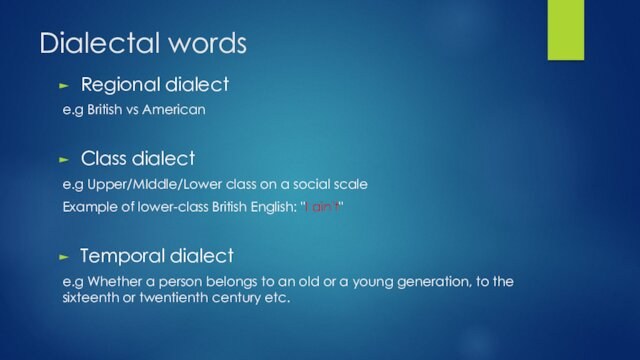
on a social scale
Example of lower-class British English: «I ain’t»
Temporal dialect
e.g
Whether a person belongs to an old or a young
generation, to the sixteenth or twentienth century etc.
Слайд 6
Old British Dialect Words to Incorporate into Conversation
DAUNCY:
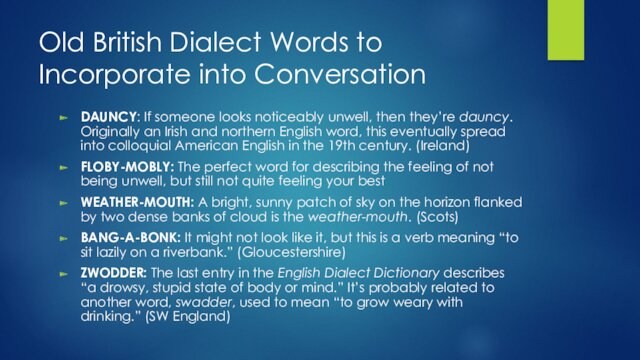
If someone looks noticeably unwell, then they’re dauncy. Originally an
Irish and northern English word, this eventually spread into colloquial
American English in the 19th century. (Ireland)
FLOBY-MOBLY: The perfect word for describing the feeling of not being unwell, but still not quite feeling your best
WEATHER-MOUTH: A bright, sunny patch of sky on the horizon flanked by two dense banks of cloud is the weather-mouth. (Scots)
BANG-A-BONK: It might not look like it, but this is a verb meaning “to sit lazily on a riverbank.” (Gloucestershire)
ZWODDER: The last entry in the English Dialect Dictionary describes “a drowsy, stupid state of body or mind.” It’s probably related to another word, swadder, used to mean “to grow weary with drinking.” (SW England)
Слайд 7
Modern British English dialectal words
Sing-small
This means “to put
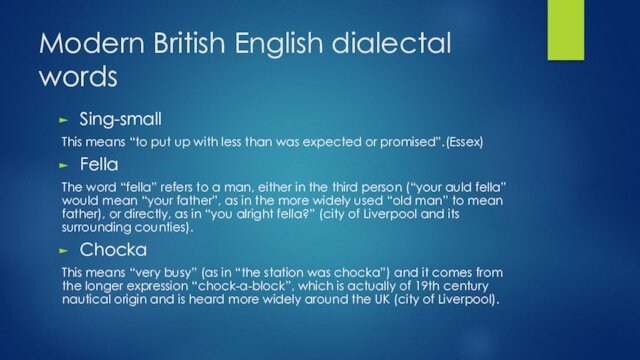
up with less than was expected or promised”.(Essex)
Fella
The word
“fella” refers to a man, either in the third person
(“your auld fella” would mean “your father”, as in the more widely used “old man” to mean father), or directly, as in “you alright fella?” (city of Liverpool and its surrounding counties).
Chocka
This means “very busy” (as in “the station was chocka”) and it comes from the longer expression “chock-a-block”, which is actually of 19th century nautical origin and is heard more widely around the UK (city of Liverpool).
Слайд 8
Geet Geet Geet walla
This simply means “very big”,
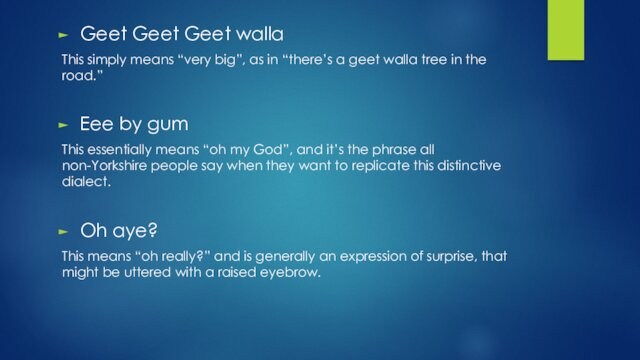
as in “there’s a geet walla tree in the
road.”
Eee by gum
This essentially means “oh my God”, and it’s
the phrase all non-Yorkshire people say when they want to replicate this distinctive dialect.
Oh aye?
This means “oh really?” and is generally an expression of surprise, that might be uttered with a raised eyebrow.
Слайд 9
«Aussie» and «Murican» and Kiwi dialects
‘Ow ya goin’?
In the

UK, we might ask someone how they are by
saying, “how are you doing?” In Australia, the equivalent expression
is “‘ow ya goin’?” or “how are you going?”
Sheila
This woman’s name is used in Australia to refer to any female person.
Flipped Flipped Flipped out
This describes an angry reaction to something, as in, “He flipped out when I told him I was leaving.” (American)
Слайд 10
Megabucks
This means “a lot of money”, as in
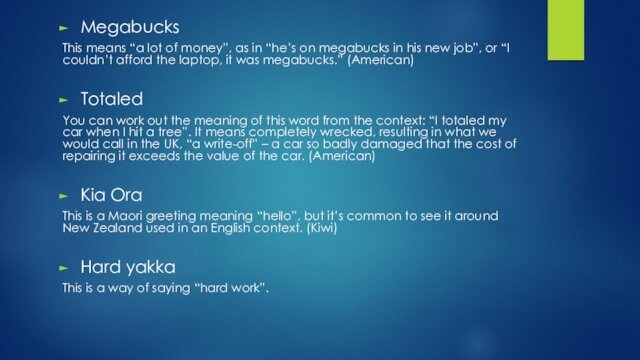
“he’s on megabucks in his new job”, or “I
couldn’t afford the laptop, it was megabucks.” (American)
Totaled
You can work
out the meaning of this word from the context: “I totaled my car when I hit a tree”. It means completely wrecked, resulting in what we would call in the UK, “a write-off” – a car so badly damaged that the cost of repairing it exceeds the value of the car. (American)
Kia Ora
This is a Maori greeting meaning “hello”, but it’s common to see it around New Zealand used in an English context. (Kiwi)
Hard yakka
This is a way of saying “hard work”.
Слайд 2Dialectal words — are the variety of a language that a
group of people speak, separated either by geography, class, or ethnicity.
Dialects can be distinguished one from another by way of:
Grammar
Pronunciation
Syntax
Vocabulary
If there’s only a difference in pronunciation, this is just an example of different accents. Note also that dialect refers to a group of people; the specific speech patterns of an individual are called an idiolect.
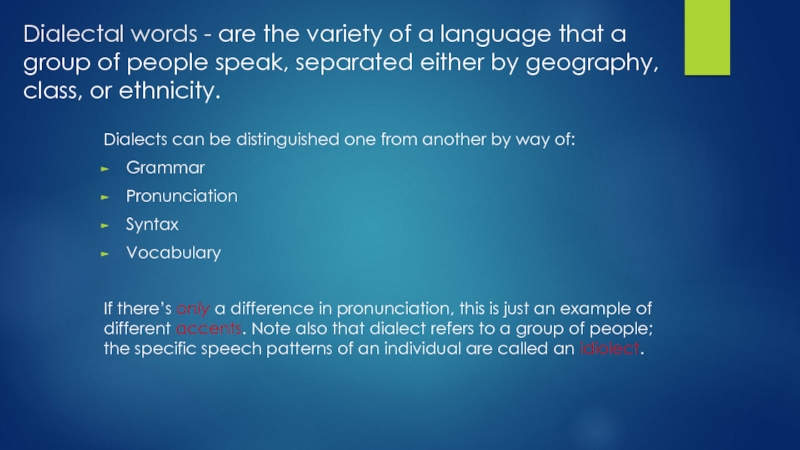
Слайд 3Dialectal words
Some dialectal words have become so familiar in standard colloquial
English that they are universally accepted as recognized units of the standard colloquial English
For example word lass meaning ‘a girl or a beloved girl’ and the corresponding lad, ‘a boy or a young man’
Dialectal words are only to be found in the style of emotive prose, very rarely in other styles.
And even here their use is confined to the function of characterizing personalities through their speech.
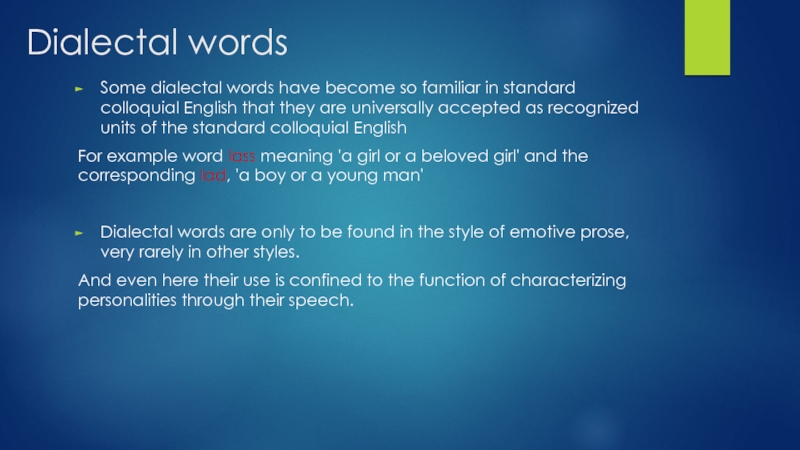
Слайд 4Dialectal words
Dialect, colloquialisms, and slang have much in common in that they all
refer to variations in speech patterns in a given language. Dialect refers to an entire set of linguistic norms that a group of people use. Colloquialisms are also generally geographic in nature, but refer to specific words or phrases that people of that region use. Thus, colloquialisms are an important part of distinguishing between dialects. Slang refers to terms that are used in specific social groups, such as for teenagers.
Try not to confuse them!
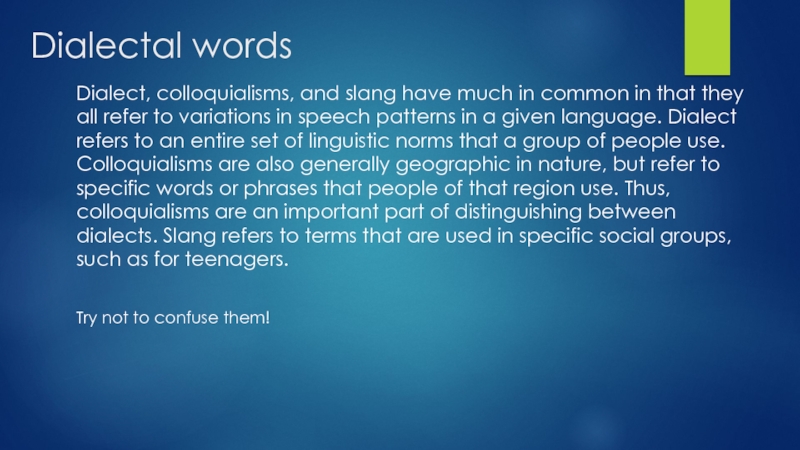
Слайд 5Dialectal words
Regional dialect
e.g British vs American
Class dialect
e.g Upper/MIddle/Lower class on a social
scale
Example of lower-class British English: «I ain’t»
Temporal dialect
e.g Whether a person belongs to an old or a young generation, to the sixteenth or twentienth century etc.
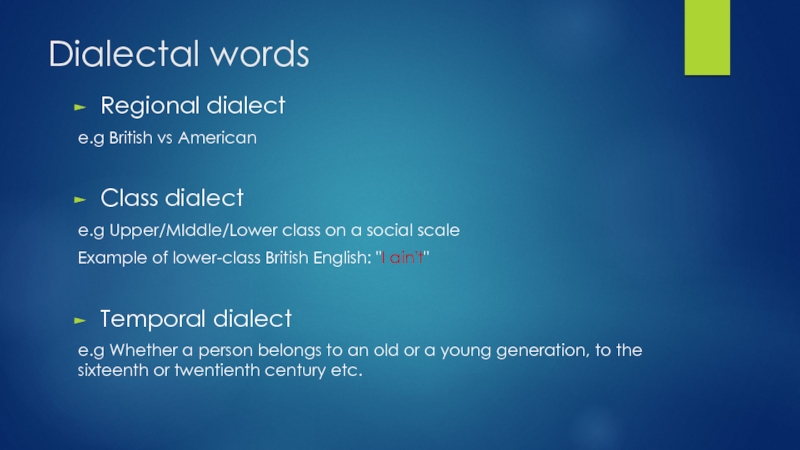
Слайд 6Old British Dialect Words to Incorporate into Conversation
DAUNCY: If someone looks
noticeably unwell, then they’re dauncy. Originally an Irish and northern English word, this eventually spread into colloquial American English in the 19th century. (Ireland)
FLOBY-MOBLY: The perfect word for describing the feeling of not being unwell, but still not quite feeling your best
WEATHER-MOUTH: A bright, sunny patch of sky on the horizon flanked by two dense banks of cloud is the weather-mouth. (Scots)
BANG-A-BONK: It might not look like it, but this is a verb meaning “to sit lazily on a riverbank.” (Gloucestershire)
ZWODDER: The last entry in the English Dialect Dictionary describes “a drowsy, stupid state of body or mind.” It’s probably related to another word, swadder, used to mean “to grow weary with drinking.” (SW England)
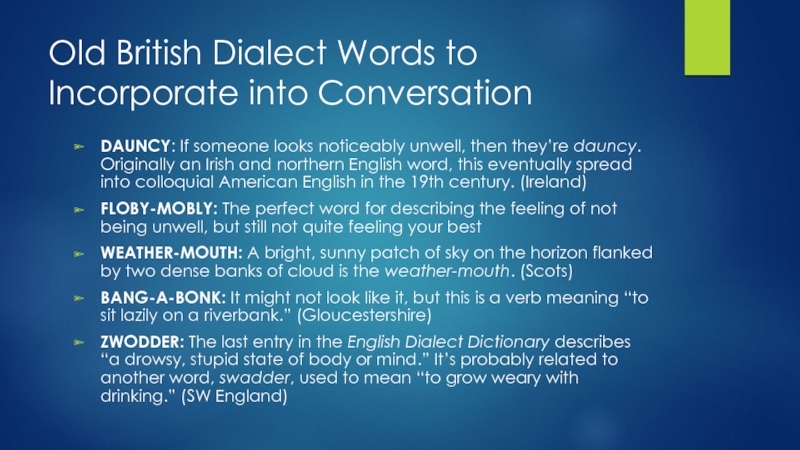
Слайд 7Modern British English dialectal words
Sing-small
This means “to put up with less
than was expected or promised”.(Essex)
Fella
The word “fella” refers to a man, either in the third person (“your auld fella” would mean “your father”, as in the more widely used “old man” to mean father), or directly, as in “you alright fella?” (city of Liverpool and its surrounding counties).
Chocka
This means “very busy” (as in “the station was chocka”) and it comes from the longer expression “chock-a-block”, which is actually of 19th century nautical origin and is heard more widely around the UK (city of Liverpool).
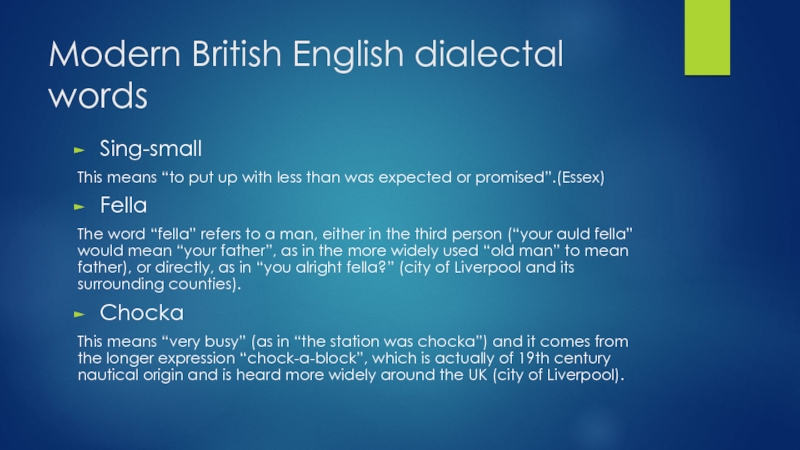
Слайд 8Geet Geet Geet walla
This simply means “very big”, as in “there’s
a geet walla tree in the road.”
Eee by gum
This essentially means “oh my God”, and it’s the phrase all non-Yorkshire people say when they want to replicate this distinctive dialect.
Oh aye?
This means “oh really?” and is generally an expression of surprise, that might be uttered with a raised eyebrow.
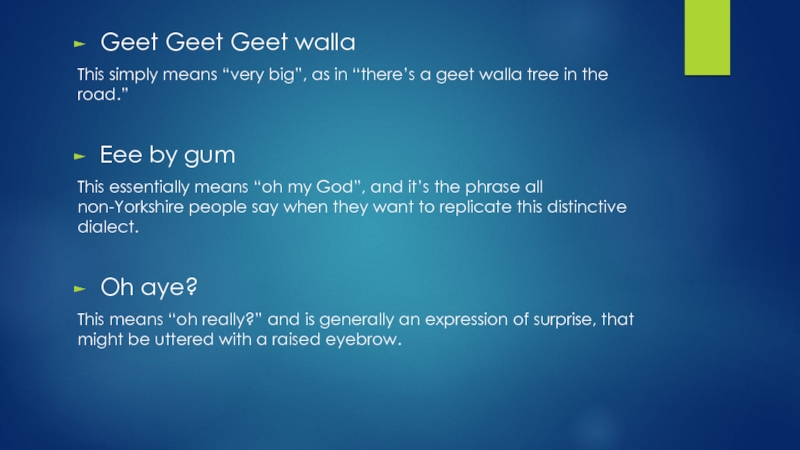
Слайд 9″Aussie» and «Murican» and Kiwi dialects
‘Ow ya goin’?
In the UK, we might
ask someone how they are by saying, “how are you doing?” In Australia, the equivalent expression is “‘ow ya goin’?” or “how are you going?”
Sheila
This woman’s name is used in Australia to refer to any female person.
Flipped Flipped Flipped out
This describes an angry reaction to something, as in, “He flipped out when I told him I was leaving.” (American)
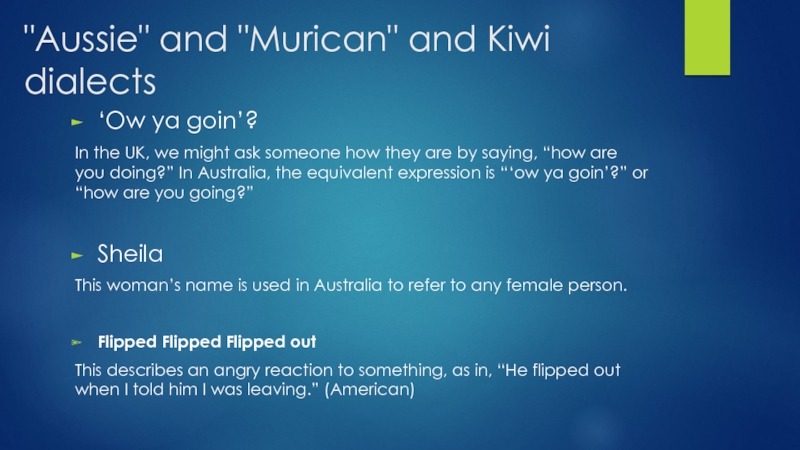
Слайд 10Megabucks
This means “a lot of money”, as in “he’s on megabucks
in his new job”, or “I couldn’t afford the laptop, it was megabucks.” (American)
Totaled
You can work out the meaning of this word from the context: “I totaled my car when I hit a tree”. It means completely wrecked, resulting in what we would call in the UK, “a write-off” – a car so badly damaged that the cost of repairing it exceeds the value of the car. (American)
Kia Ora
This is a Maori greeting meaning “hello”, but it’s common to see it around New Zealand used in an English context. (Kiwi)
Hard yakka
This is a way of saying “hard work”.
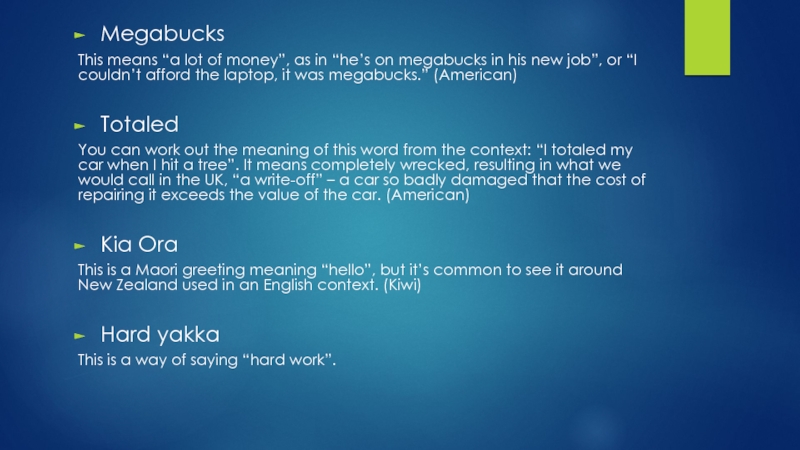
1. Dialectal words
2. Dialectal words — are the variety of a language that a group of people speak, separated either by geography, class, or ethnicity.
Dialects can be distinguished one from another by way of:
Grammar
Pronunciation
Syntax
Vocabulary
If there’s only a difference in pronunciation, this is just an example
of different accents. Note also that dialect refers to a group of
people; the specific speech patterns of an individual are called an
idiolect.
3. Dialectal words
Some dialectal words have become so familiar in standard
colloquial English that they are universally accepted as
recognized units of the standard colloquial English
For example word lass meaning ‘a girl or a beloved girl’ and the
corresponding lad, ‘a boy or a young man’
Dialectal words are only to be found in the style of emotive
prose, very rarely in other styles.
And even here their use is confined to the function of characterizing
personalities through their speech.
4. Dialectal words
Dialect, colloquialisms, and slang have much in common in that
they all refer to variations in speech patterns in a given language.
Dialect refers to an entire set of linguistic norms that a group of
people use. Colloquialisms are also generally geographic in nature,
but refer to specific words or phrases that people of that region
use. Thus, colloquialisms are an important part of distinguishing
between dialects. Slang refers to terms that are used in specific
social groups, such as for teenagers.
Try not to confuse them!
5. Dialectal words
Regional dialect
e.g British vs American
Class
dialect
e.g Upper/MIddle/Lower class on a social scale
Example of lower-class British English: «I ain’t»
Temporal
dialect
e.g Whether a person belongs to an old or a young generation, to
the sixteenth or twentienth century etc.
6. Old British Dialect Words to Incorporate into Conversation
DAUNCY: If someone looks noticeably unwell, then they’re dauncy.
Originally an Irish and northern English word, this eventually spread into
colloquial American English in the 19th century. (Ireland)
FLOBY-MOBLY: The perfect word for describing the feeling of not being
unwell, but still not quite feeling your best
WEATHER-MOUTH: A bright, sunny patch of sky on the horizon flanked
by two dense banks of cloud is the weather-mouth. (Scots)
BANG-A-BONK: It might not look like it, but this is a verb meaning “to
sit lazily on a riverbank.” (Gloucestershire)
ZWODDER: The last entry in the English Dialect Dictionary describes “a
drowsy, stupid state of body or mind.” It’s probably related to another
word, swadder, used to mean “to grow weary with drinking.” (SW
England)
7. Modern British English dialectal words
Sing-small
This means “to put up with less than was expected or promised”.(Essex)
Fella
The word “fella” refers to a man, either in the third person (“your auld
fella” would mean “your father”, as in the more widely used “old man” to
mean father), or directly, as in “you alright fella?” (city of Liverpool and its
surrounding counties).
Chocka
This means “very busy” (as in “the station was chocka”) and it comes from
the longer expression “chock-a-block”, which is actually of 19th century
nautical origin and is heard more widely around the UK (city of Liverpool).
8.
Geet
Geet Geet walla
This simply means “very big”, as in “there’s a geet walla tree in the
road.”
Eee
by gum
This essentially means “oh my God”, and it’s the phrase all nonYorkshire people say when they want to replicate this distinctive
dialect.
Oh
aye?
This means “oh really?” and is generally an expression of surprise,
that might be uttered with a raised eyebrow.
9. «Aussie» and «Murican» and Kiwi dialects
«Aussie» and «Murican» and Kiwi
dialects
‘Ow
ya goin’?
In the UK, we might ask someone how they are by saying, “how are
you doing?” In Australia, the equivalent expression is “‘ow ya
goin’?” or “how are you going?”
Sheila
This woman’s name is used in Australia to refer to any female
person.
Flipped Flipped Flipped out
This describes an angry reaction to something, as in, “He flipped out
when I told him I was leaving.” (American)
10.
Megabucks
This means “a lot of money”, as in “he’s on megabucks in his new job”, or “I
couldn’t afford the laptop, it was megabucks.” (American)
Totaled
You can work out the meaning of this word from the context: “I totaled my car
when I hit a tree”. It means completely wrecked, resulting in what we would
call in the UK, “a write-off” – a car so badly damaged that the cost of repairing
it exceeds the value of the car. (American)
Kia
Ora
This is a Maori greeting meaning “hello”, but it’s common to see it around
New Zealand used in an English context. (Kiwi)
Hard
yakka
This is a way of saying “hard work”.
